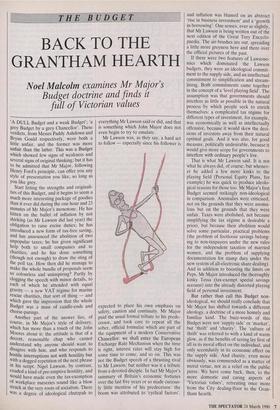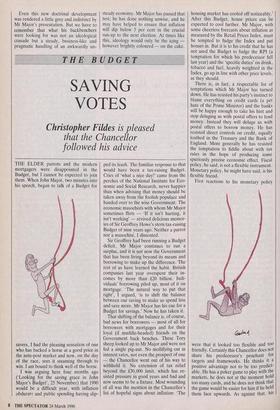THE BUDGET
BACK TO THE GRANTHAM HEARTH
Noel Malcolm examines Mr Major's Budget doctrine and finds it full of Victorian values
'A DULL Budget and a weak Budget'; 'a grey Budget by a grey Chancellor'. These verdicts, from Messrs Paddy Ashdown and Bryan Gould respectively, were both a little unfair, and the former was more unfair than the latter. This was a Budget which showed few signs of weakness and several signs of original thinking; but it has to be admitted that Mr Major, following Henry Ford's principle, can offer you any style of presentation you like, so long as you like grey. Start listing the strengths and originali- ties of this Budget, and it begins to seem a much more interesting package of goodies than it ever did during the one hour and 23 minutes of Mr Major's monotone. He has bitten on the bullet of inflation by not shirking (as Mr Lawson did last year) the obligation to raise excise duties; he has introduced a new form of tax-free saving, and has announced the abolition of two unpopular taxes; he has given significant help both to small companies and to charities; and he has done something (though not enough) to draw the sting of the poll tax. How then did he manage to make the whole bundle of proposals seem so colourless and uninspiring? Partly by Clogging the speech with minor details, to each of which he attended with equal gravity — a new VAT regime for marine rescue charities, that sort of thing — and which gave the impression that the whole Budget was a mass of candle-ends and cheese-parings. Another part of the answer lies, of course, in Mr Major's style of delivery, which has more than a touch of the John Moores about it: the attitude is that of a decent, reasonable chap who cannot understand why anyone should want to disagree with him, and who responds to hostile interruptions not with hostility but with a dogged repetition of the next phrase in his script. Nigel Lawson, by contrast, exuded a kind of pre-emptive hostility, and would have made even the tax-exemption of workplace nurseries sound like a blow struck at the very roots of socialism. There was a degree of ideological chutzpah to everything Mr Lawson said or did, and that is something which John Major does not even begin to try to emulate.
Mr Lawson was, as they say, a hard act to follow — especially since his follower is expected to place his own emphasis on safety, caution and continuity. Mr Major paid the usual formal tribute to his prede- cessor, and took care to repeat all the sober, official formulae which are part of the equipment of a modern Conservative Chancellor: we shall enter the European Exchange Rate Mechanism when the time is right, interest rates will stay high for some time to come, and so on. This was not the Budget speech of a thrusting rival to Mr Lawson; but neither was it a tribute from a devoted disciple. In fact Mr Major's summary of Britain's economic fortunes over the last five years or so made curious- ly little mention of his predecessor: the boom was attributed to 'cyclical factors', and inflation was blamed on an abstract 'rise in business investment' and a 'growth in borrowing'. One senses, ever so slightly, that Mr Lawson is being written out of the next edition of the Great Tory Encyclo- paedia. The air-brushes are out, spreading a little more greyness here and there over the official pictures of the past.
If there were two features of Lawsono- mics which dominated the Lawson budgets, they were an ideological commit- ment to the supply side, and an intellectual commitment to simplification and stream- lining. Both commitments came together in the concept of a 'level playing field'. The assumption was that governments should interfere as little as possible in the natural process by which people seek to enrich themselves: a complicated tax regime for different types of investment, for example, was economically as well as intellectually offensive, because it would skew the deci- sions of investors away from their natural optimal goals. And it was also, for good measure, politically undesirable, because it would give more scope for governments to interfere with ordinary people's live.
That is what Mr Lawson said. It is not what he always did, of course; but whenev- er he added a few more kinks to the playing field (Personal Equity Plans, for example) he was quick to produce ideolo- gical reasons for those too. Mr Major's first Budget seemed strikingly non-ideological in comparison. Anomalies were criticised, not on the grounds that they were anoma- lous but on the grounds that they were unfair. Taxes were abolished, not because simplifying the tax regime is desirable a priori, but because their abolition would solve some particular, practical problems (the problem of footloose savings belong- ing to non-taxpayers under the new rules for the independent taxation of married women, and the problem of supplying documentation for stamp duty under the new system of all-electronic share dealing). And in addition to boosting the limits on Peps, Mr Major introduced the thoroughly kinky Tessa (tax-exempt special savings account) into the already distorted playing field of personal investment.
But rather than call this Budget non- ideological, we should really conclude that Mr Major has shifted towards a different ideology, a doctrine of a more homely and familiar kind. The buzz-words of this Budget were not 'supply side' or 'market', but 'thrift' and 'charity'. The 'culture of thrift' was referred to with a kind of warm glow, as if the benefits of saving lay first of all in its moral effect on the individual, and only secondarily in its economic effect on the supply side. And charity, even more obviously, was commended as a matter of moral virtue, not as a relief on the public purse. We have come back, then, to the more domestic and caring aspects of 'Victorian values', retreating once more from the City dealing-floor to the Gran- tham hearth. Even this new doctrinal development was rendered a little grey and indistinct by Mr Major's presentation. But we have to remember that what his backbenchers were looking for was not an ideological crusade but a steady, business-like and pragmatic handling of an awkwardly un- steady economy. Mr Major has passed that test; he has done nothing unwise, and he may have helped to ensure that inflation will dip below 5 per cent in the crucial. run-up to the next election. At times like this, ideology would only be the icing however brightly coloured — on the cake.



















































 Previous page
Previous page